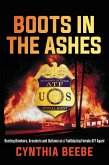Close to midnight on May 17, 1951, four north Alabama lawmen drove to a bootlegger's home to serve an arrest warrant. Before the clock struck twelve, the bootlegger lay dead in front of the house he shared with his wife and eight children, and three of the four officers were also dead. Afterward, a sixteen-year-old boy would face a series of trials that would divide a county and thrust the state of Alabama into the national spotlight. In this good, old-fashioned, true-crime story, Lesa Carnes Shaul draws on court documents, trial transcripts, newspaper articles, and personal interviews to weave together a rollicking and illuminating tale of murder and revenge. Besides the shooting itself and the subsequent trials, the narrative explores the cultural shifts that occurred after World War II in the United States, the Deep South, and the state of Alabama in particular. Immediately after the war, many southern states, still recovering from the lingering effects of the Great Depression, stood poised to advance toward a progressive New South yet struggled with the legacy of race and class inequities, retrograde government policies, and a stubborn resistance to change. Sand Mountain represented a kind of "land that time forgot" during this era, even as nearby cities like Huntsville and Birmingham sought to claim a place on the national stage in technology, industry, business, and medicine. Through her investigation of this murder trial, Shaul reveals the backwoods justice at play in this isolated area of the American South.
Hinweis: Dieser Artikel kann nur an eine deutsche Lieferadresse ausgeliefert werden.
Hinweis: Dieser Artikel kann nur an eine deutsche Lieferadresse ausgeliefert werden.








